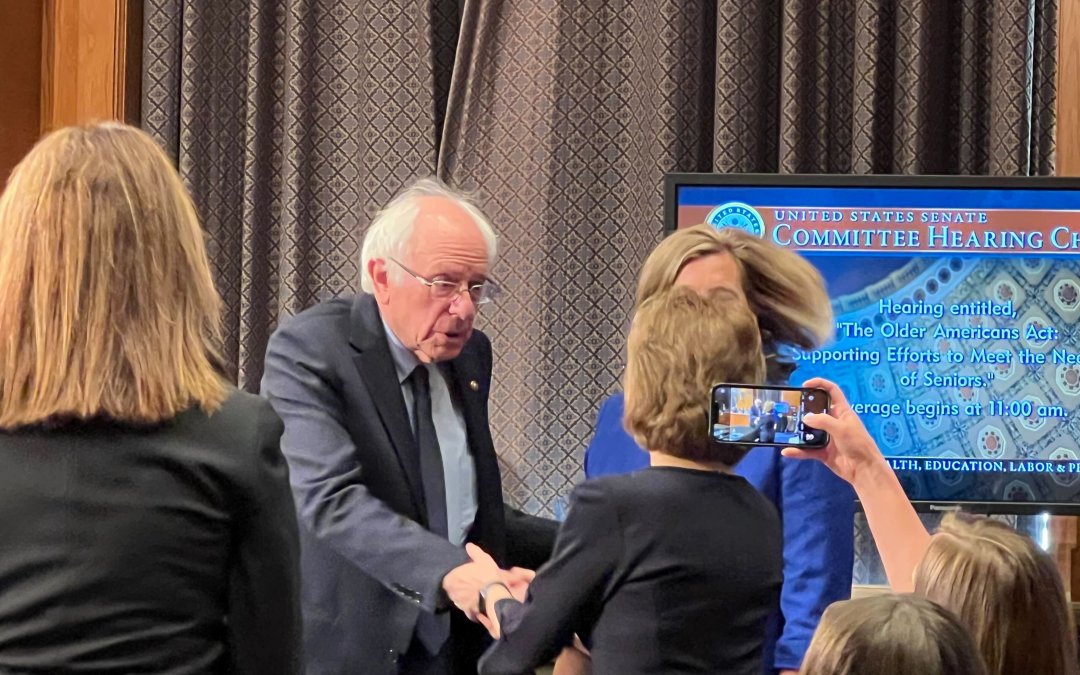WASHINGTON — Sen. Bernie Sanders (I-Vt.) on Thursday called on fellow members of the Senate Health, Education, Labor, and Pensions Committee to extend and increase funding for the Older American Act to meet the urgent needs of America’s senior citizens.
The Older Americans Act, signed into law in 1965, authorizes government funding for various critical services for the country’s elderly. The law also supports career opportunities, activities to combat loneliness and isolation, disease prevention, job training, protection from abuse, and access to food, water, and places like the doctor’s office or grocery store. However, the law is due to expire on Sept. 30, creating a new urgency to renew and re-fund it.
During Thursday’s hearing, there appeared to be bipartisan support for reauthorizing the measure, but it was unclear whether both sides of the aisle would agree on how much funding should increase. For instance, ranking member Bill Cassidy (R-La.) emphasized the importance of reauthorizing the Old American Act by improving the programs for seniors and leveraging public-private partnerships to expand service.
“We should take lessons learned during the pandemic and use that new knowledge as how we can better serve those who we intend to serve,” said Cassidy, but seemed hesitant about providing an increase in funding,
According to the Organization for Economic Cooperation and Development (OECD), about 23 percent of Americans over 65 live in poverty.
“One out of every four seniors in America is trying to survive for a new continent less than $15,000 a year. And I’m not quite sure if anybody comes to live with $15,000 a year,” said Sanders, chairman of the HELP committee.
The committee heard from several stakeholders who emphasized the importance of getting additional money for seniors. Among those was Dorothy Hutchins, a 93-year-old Alexandria, Virginia, resident, who testified remotely. She shared her story of struggle after her husband’s death and later had hip surgeries. She highlighted the support she received through the Older Americans Act in maintaining her health.
“Everyone deserves the chance to live where they choose, and for most of us, we want to remain in our homes and communities,” Hutchins told lawmakers.
Since 2016, the number of seniors in America has massively increased despite increased demand. In 2020, almost one in every six adults in the United States is age 65 or older. In 1920, the proportion was less than one in 20.
Sanders argued that adjusting for inflation, funding for the law has decreased by nearly 20 percent. Sanders said that providing adequate nutrition meals to seniors is more cost-effective than treating preventable hospital costs.
“Malnutrition among seniors today costs our society over $50 billion each and every year,” said Sanders.
Ellie Hollander, President and CEO of the Meals on Wheels program, testified before the committee to address the growing gap in senior nutrition resources. She highlighted the struggles of severe hunger, with 2.5 million low-income food-insecure people not receiving meals they’re eligible for. Due to high demand, the Meals on Wheels program has to put them on the waitlist.
Hollander stated that to close the current gap for the nutrition program to be effective for seniors, we need to estimate a $774 million increase. The nutrition program alone must close the current services gap.
Ramsey Alwin, president and CEO of the National Council on Aging, pushed for an increase in the financing and modernization of senior centers to support healthy aging.
“We must address lessons learned from the pandemic, reinstate a separate title for senior senators, strengthen the authorization for modernizing them, and increase funding for senior nutrition programs to allow for parity between home-delivered and congregate meal sites,” Alwin said.
The HELP Committee has invited more comments from stakeholders until March 21 via its email oaa@help.senate.gov
A link to more information can be found here.


